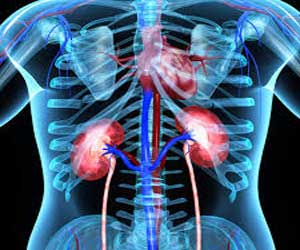- Home
- Editorial
- News
- Practice Guidelines
- Anesthesiology Guidelines
- Cancer Guidelines
- Cardiac Sciences Guidelines
- Critical Care Guidelines
- Dentistry Guidelines
- Dermatology Guidelines
- Diabetes and Endo Guidelines
- Diagnostics Guidelines
- ENT Guidelines
- Featured Practice Guidelines
- Gastroenterology Guidelines
- Geriatrics Guidelines
- Medicine Guidelines
- Nephrology Guidelines
- Neurosciences Guidelines
- Obs and Gynae Guidelines
- Ophthalmology Guidelines
- Orthopaedics Guidelines
- Paediatrics Guidelines
- Psychiatry Guidelines
- Pulmonology Guidelines
- Radiology Guidelines
- Surgery Guidelines
- Urology Guidelines
Is kidney failure a man's disease? The data says Yes

A new analysis of patients requiring dialysis or kidney transplant shows men are far more likely than women to get kidney failure. The study appearing in Clinical Kidney Journal showed that the incidence of men starting renal replacement therapy due to diabetes and to glomerulonephritis/sclerosis was more than double that of their female counterparts.
Kidneys filter out toxic waste from the blood and regulate the fluid balance in the body as well as the balance of electrolytes and acid/base amongst others. When kidneys silently stop working this can create a life-threatening situation. Renal replacement therapy, RRT, (dialysis or kidney transplantation) may save the lives of many patients for years and even decades, as kidney function can be replaced by machines for a long period of time - but patients on dialysis (and transplanted patients to a lesser extent) have shorter life expectancies. This is why kidney failure (end-stage renal disease) should be prevented wherever possible.
A new analysis of data in the ERA-EDTA Registry shows that men are affected by kidney failure much more often than women. In 2016, 26,446 men and 14,820 women started renal replacement therapy. Amongst older patients (>75 years of age), the difference was even more striking: the incidence in men was 2.7 times higher than that in women. 'One can only speculate about the reasons', explains Professor Ziad Massy (Paris), Clinical Nephrology Governance Chair/Chair of the Registry. The protective effects of oestrogens in women and/or the damaging effects of testosterone might cause kidney function to decline faster in men than in women. Moreover, elderly women seem to be more inclined to choose conservative care instead of RRT.
However, hypertension or diabetes may also be implicated. There are distinct gender differences in the incidence and severity of hypertension. It is more common in men and could be prevented by lifestyle changes. 'You can reduce it to a simple formula', says Massy. 'Beyond treatment, more sports and less body weight will result in lower blood pressure. ´
The analysis also showed that the incidence of men starting renal replacement therapy due to diabetes and to glomerulonephritis/sclerosis was more than double that of their female counterparts. Again therapeutic strategies, as well as lifestyle changes, are available to optimize the control of diabetes. Finally, women are known to have better outcomes for some forms of glomerulonephritis, e.g. membranous (MGN) as well as focal and segmental glomerulosclerosis (FSGS) [4], which might explain why fewer women have to start dialysis because of these diseases. Additionally, Professor Massy adds, 'if we want to reduce the incidence of chronic kidney disease in men, we should, therefore, concentrate on the early detection and control of these risk factors. Obviously, we need to broadcast these messages if we want to reduce the number of men who have to start dialysis'.
For more details click on the link: http://dx.
Author Dr.Kartikeya Kohli DNB (Medicine), MRCP, Fellow DNB(Nephrology) is a Consultant Physician and Nephrologist at Sanjeevan Hospital, New Delhi

Disclaimer: This site is primarily intended for healthcare professionals. Any content/information on this website does not replace the advice of medical and/or health professionals and should not be construed as medical/diagnostic advice/endorsement or prescription. Use of this site is subject to our terms of use, privacy policy, advertisement policy. © 2020 Minerva Medical Treatment Pvt Ltd